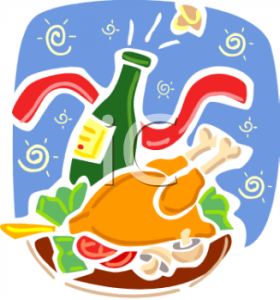 “My banquet is all prepared”: Come on and Celebrate!
“My banquet is all prepared”: Come on and Celebrate!
Speaking about food and cultures: an African lady, who used to work for an ethnic Indian family in East Africa, once told me: “You Indians take so much time to cook, but you eat it all so quickly.” As an Indian, I had never thought of that! Come to think of it, it seems so true. Our women spend most of their day cooking – despite the grinding machines and ‘mixies’ these days! Traditionally and even now in most Indian families people squatted on the floor while eating, and used their fingers. Both these factors could be accelerating the speed of eating. Yet, in the Indian culture, people sit and talk for long before and after the actual hurried eating. In most cultures a meal […]
Author: selvam
Sermon for 26th Sunday in Ordinary Time – Year A Homily
 LOVE
LOVE
It is said that at the time of Jesus the rabbis could count up to 613 commandments contained in the Law: 365 were prohibitions (don’t do this!) and 248 were prescriptive (do this!). Some of the rabbis considered all these commandments to be equally important, while others continued to debate to identify the most important commandment. That is why the Pharisees and Sadducees had reasons to ask Jesus, “Which is the greatest commandment of the Law?” even if their intention was only to put Jesus to the test. Apparently Jesus gives an answer that is similar to those given by some of the rabbis. For instance, there is a story about one rabbi Hillel, who lived a few years before Jesus. A ‘pagan’ went to rabbi Hillel and challenged him, “I will believe in the value of Torah, if you can […]
Sermon for the Feast of the Holy Trinity – Cycle A Homily
 How real is your God?
How real is your God?
I once had a spiritual director who was fond of asking the question: “What is your God like?” She would then challenge me to go even deeper as she would continue to ask: “What does God feel like for you? What does He smell like? What does He taste like? What does He look like? What does He sound like for you?” Initially these questions seemed silly, and even difficult to answer. Eventually they opened up for me a whole new way of perceiving God. For instance, if you were to ask me: “What does God smell like for you?” I might say something like: “He smells like the fragrance of a cool evening in a hilly area after some showers; the air is fresh; there is […]
Scaffoldings 1: Situation of Youth Today
1.1. People say youth are…
Objectives:
To understand the situation of participants as youth.
To have a realistic attitude toward youth.
Download pdf:
1.2. Let’s get serious: What is youth?
Objectives:
To define youth.
To continue understand deeper meaning of youth.
To build hope of living positively as youth.
1.3. Situation of African Youth
Objectives:
To understand the situation of African youth.
To help participants see the need for life-skills.
1.4. Healthy youth behaviour
Objectives:
The understand the importance of life skills.
To build hope that to handle situation of youth right attitude is needed.
1.5. Scaffoldings
Objectives:
To understand meaning and approach of Scaffoldings training.
To workout the logistics for the smooth running of the programme.
Scaffoldings 2: Self Awareness & Acceptance
2.1 Opening Up the Layers
Objectives:
To understand that the self has different layers
To create a sense of wonder about the self
2.2 Where Am I?
Objectives:
To help understand the self using symbolic language.
To appreciate the fact that the self being a mystery is best expressed in symbols.
2.3 How Am I?
Objectives:
To understand the second layer of the self which includes one’s attitudes and behaviour.
To appreciate the fact that our thoughts and feelings affect our behaviour.
2.4 Who Am I?
Objectives:
To get into the third layer of the self.
To get in touch with the deepest desire that pushes one to invest one’s energies.
To have a vision of the self that flows from understanding that I am in the image of God.
2.5 Soup for the Soul